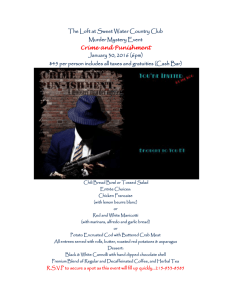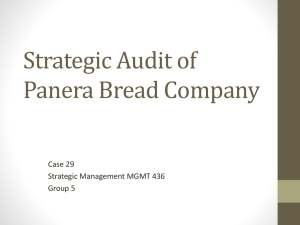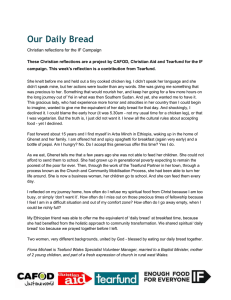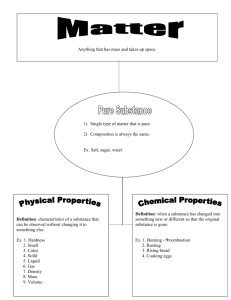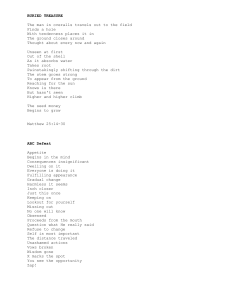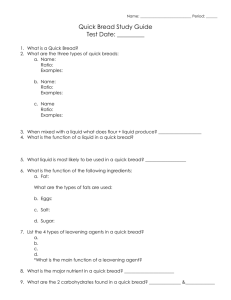19 Sunday in Ordinary Time August 9, 2015 12 Noon & 5:30 Liturgies
advertisement
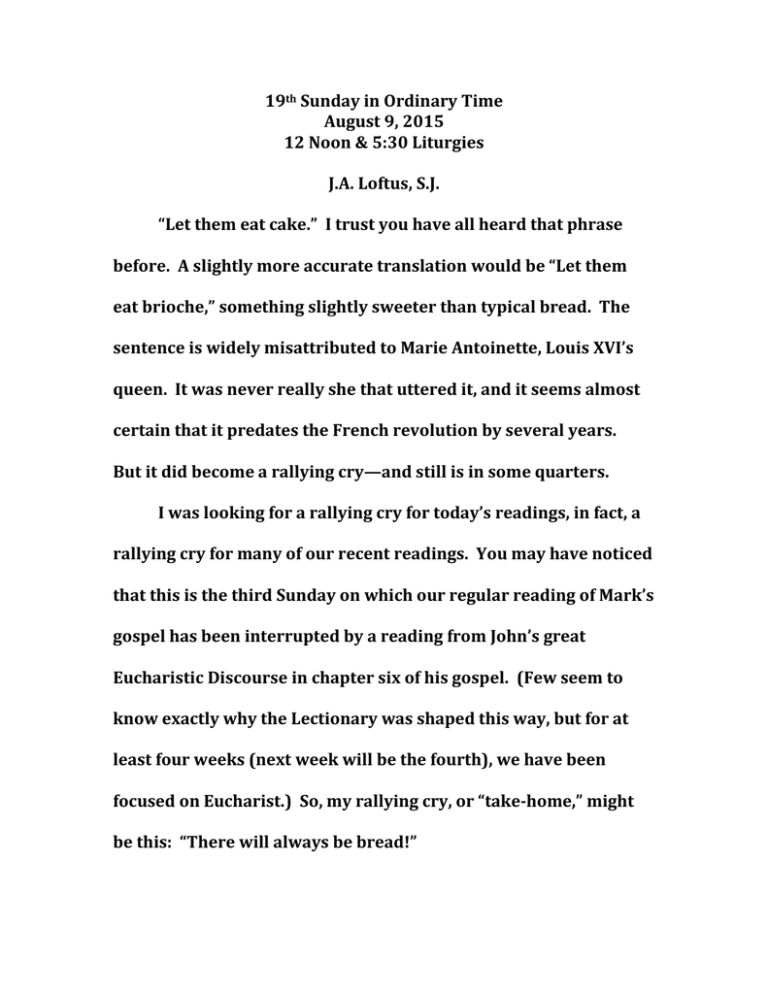
19th Sunday in Ordinary Time August 9, 2015 12 Noon & 5:30 Liturgies J.A. Loftus, S.J. “Let them eat cake.” I trust you have all heard that phrase before. A slightly more accurate translation would be “Let them eat brioche,” something slightly sweeter than typical bread. The sentence is widely misattributed to Marie Antoinette, Louis XVI’s queen. It was never really she that uttered it, and it seems almost certain that it predates the French revolution by several years. But it did become a rallying cry—and still is in some quarters. I was looking for a rallying cry for today’s readings, in fact, a rallying cry for many of our recent readings. You may have noticed that this is the third Sunday on which our regular reading of Mark’s gospel has been interrupted by a reading from John’s great Eucharistic Discourse in chapter six of his gospel. (Few seem to know exactly why the Lectionary was shaped this way, but for at least four weeks (next week will be the fourth), we have been focused on Eucharist.) So, my rallying cry, or “take-home,” might be this: “There will always be bread!” Whether the manna in Moses’ desert, the hearth cake under Elijah’s broom tree, the twelve left-over baskets in Mark’s gospel, the multiplication of loaves in all gospels, the message is the same: “There will always be bread!” God will always provide for God’s people, at least the raw materials for sustenance. There will always be bread—and bread for life, life in fullness, even for life eternal. Bread we will always have. Life…ah, life has to be created and fashioned by us. God always provides the raw materials; what you and I to with those materials is what creates a life for each one of us. And we are all different, with different raw materials to work with, different talents, different dispositions, different characters and personalities. The bread of which Jesus speaks, and Moses speaks, and Elijah speaks, is not to be taken only literally. It is sometimes just bread; other times it is all the other building blocks with which we build a life of caring and of justice and of love. This is the love of which St. Paul speaks so eloquently today. We are all offered the bread. “There will always be bread!” What’s most important is what you and I will do with the bread. 2 We each have a life to build, a character to shape, a love to let overflow. And it will look different for each and every one of us sitting here today. David Brooks is a New York Times columnist and Yale University professor who has a new book out called The Road to Character. His thesis is fascinating: that example is the best teacher of moral improvement. He fears many in our own generation have lost a sense of a moral core, a need to work at developing character. He thinks many have forgotten that we can aim higher than mere happiness in life. We are given the raw materials, the bread, to fashion a life of moral joy. Brooks provides brief biographies of some strangely different people from throughout history who developed character and made a difference. It is a strange collection of stories featuring people as diverse as General George Marshall, the one whom Winston Churchill called the “organizer of victory” in the Second World War, and Dwight Eisenhower, the Supreme Commander of Allied Forces in World War II. There’s also St. Augustine and Dorothy Day and A. Philip Randall who established the first black 3 labor union in the United States. There are many others. People of great character. These are all people who realized it did not really matter what we expected from life, but rather what life expected from us (p. 22). They are all people who asked the question that Presbyterian theologian, Fredrick Buechner framed this way: “At what points do my talents and deep gladness meet the world’s deep need” (p.22)? There will always be bread! That’s God’s job. What will any of us decide to do with it? Tom Brokaw, a name we all recognize, also has a new book out. It’s called A Lucky Life Interrupted: A Memoir of Hope. It tells his story of how he went from the top of his career to a years-long battle with cancer in his 70s, and what he learned in the process. And then there is also a remarkable book by the 39th President of the United States, Jimmy Carter. It is called simply A Full Life. Jimmy is now 90. It is the story of a Naval Officer and Peanut Farmer who served four relatively drab years at the White House only to re-invent himself as one of the most spectacular post office presidents in American History. He, with his wife Rosalyn, have helped countless poor people across the world with food, 4 health care, and housing and have created the conditions of possibility for whole nations to live in peace to this day. None of these people ever looked backwards or lamented the bread they were given. They baked! “There will always be bread!” That’s God Promise. Great or small, black or white, rich or poor, well educated or not, the question is: what are you baking? It’s the baking that makes Eucharist, not just the bread. “I give you myself for the life of the world,” says Jesus. What life are we baking? Peace! 5

